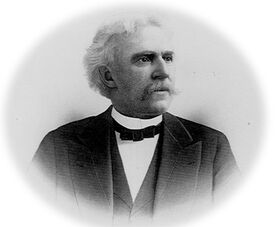
Governor-General John McDowell.
The Age of Renewal speech was a speech given by North American Governor-General John McDowell in New York City on 11 October 1882. It proved to be the most effective speech of McDowell's career, setting the stage for the Liberal Party's victory in the 1883 Grand Council elections, and giving a striking name to McDowell's reform agenda and to his historical era.
The Age of Renewal speech came four months before the upcoming Grand Council elections, at a time when McDowell faced increasing accusations that he was an unprincipled trimmer whose only real commitment was to his own empowerment. It was to address these criticisms that McDowell spoke in New York of his political philosophy and plans for the future.
McDowell began by speaking of the chaos and political upheaval that had been troubling Europe since the outbreak of the French Revolution in the winter of 1879-80. "We are living at a time of momentous change, one which has seen the decline of monarchies and the end of empires we once thought immortal. The faiths and truths of yesterday seem outworn and curiously meaningless. Our way of life is being threatened as never before."
McDowell then contrasted Europe's chaos with the continued stability of the C.N.A. under his administration. "Yet we hold on, we organize, we persevere. We shall pass through this dark corridor, just as we did the Rebellion, the Crisis Years, and other times of distress. Our fathers had problems, which they solved. Ours may appear greater than theirs, but so are the resources we command. Even now our problems are being resolved, our wounds healed, our nation renewed. More will be needed before we achieve our ambitions, and we shall sacrifice much in order to save; we must change in order to preserve."
McDowell reviewed the accomplishments of his administration. "This administration has done much to preserve the North American farm, the North American business firm, the North American banking system, and has succeeded in all its efforts, as the N.F.A. and related agencies prove." Then, having established his credentials as a reformer, McDowell laid out an agenda for a second term. "But more must be done in the future. Every North American has the right to hold a job, to a fair wage, to a fair return on his investment, to a decent place in which to live, to security in his home, to the knowledge that his government knows of his needs, and is prepared to help him help himself."
McDowell concluded his speech by calling on his audience to dedicate themselves to the task of building a better future. "Few of these goals have been reached, and some may appear impossible of achievement in our lifetime. But we must make the effort. For this reason, I call upon all North Americans to undertake a time of soul-searching, to go into the Wilderness and then return, better prepared and more willing to work for a better nation and world. North America is in the midst of its Age of Renewal, from which it will emerge greater and more powerful than before."
The Age of Renewal speech was the subject of much discussion and analysis. Some of McDowell's hearers interpreted his words to mean that he intended to accellerate the pace of reform. Others believed that his desire "to work for a better nation and world" meant that he intended to have the C.N.A. replace Great Britain as the leading nation in the British Empire. However, when he was questioned about these matters, McDowell was vague and evasive.
The opposition Conservative Party denounced the Age of Renewal as too radical, and accused McDowell of tyranny and of wishing to destroy the rights of the individual. The upstart People's Coalition saw the Age of Renewal as an attempt by McDowell to upstage their own thoroughgoing reform agenda by offering the nation "the form of change, but not the substance." Sobel concluded that rather than being a blueprint for a new society, the Age of Renewal was simply a meaningless rubric for any future programs McDowell might pursue.
Sobel's source for the text of the Age of Renewal speech is the 12 October 1882 issue of the New York Herald.
